Understanding High Blood Pressure (Hypertension)
What is Blood Pressure?
Blood pressure is the force of blood pushing against the walls of your arteries as your heart pumps. It’s measured using two numbers:
- Systolic (top number): pressure when the heart beats
- Diastolic (bottom number): pressure when the heart rests between beats
A healthy blood pressure is less than 120/80.
What is High Blood Pressure (Hypertension)?
High blood pressure, or hypertension, means your blood is pushing too hard against your artery walls. Over time, this puts strain on your heart and blood vessels and can lead to heart attacks, strokes, kidney damage, or heart failure—even if you feel fine. That’s why it’s oftentimes called the “silent killer.”
Who Gets High Blood Pressure?
Nearly half of adults in the U.S. have high blood pressure. You're more likely to have it if you:
- Are over 60
- Have obesity
- Don’t get regular exercise
- Eat too much salt
- Drink too much alcohol
- Have a family history of high blood pressure
- Stages of Blood Pressure:
- Normal: Less than 120/80
- Elevated: 120–129 / under 80
- Stage 1 Hypertension: 130–139 / 80–89
- Stage 2 Hypertension: 140+ / 90+
Symptoms:
Most people with high blood pressure have no symptoms. But very high readings can cause headaches, blurry vision, chest pain, or shortness of breath.
Diagnosing and Monitoring
High blood pressure is usually found during routine checkups. If your reading is high, your provider may ask you to check your blood pressure at home to rule out "white coat hypertension" (high readings only at the doctor’s office).
Tips for checking blood pressure at home:
- Rest quietly for 5 minutes before checking
- Sit with both feet flat on the floor and arm supported at chest level
- Use the correct cuff size
- Avoid caffeine, smoking, and exercise for 30 minutes before
- Keep a log of your readings
How to Manage High Blood Pressure
Lifestyle Changes First:
Making these changes can make a big difference:
- Eat less salt (under 2,000 mg a day)
- Lose weight if needed
- Exercise regularly (even walking 30 minutes a day helps!)
- Cut back on alcohol
- Quit smoking
Medications:
If lifestyle changes aren’t enough, your doctor may prescribe blood pressure medicine. Some people, especially those with heart disease, diabetes, or kidney disease, may start medication earlier. You may need more than one medicine to reach your goal.
Target Blood Pressure:
Most people should aim for less than 130/80. Your doctor may adjust this goal depending on your age and overall health.
Why It Matters
Controlling high blood pressure lowers your risk of serious health problems, helps protect your heart and kidneys, and improves your overall well-being. Many people control their blood pressure with healthy habits-you can too.
Let us know if you have questions, need help checking your pressure at home, or are having side effects from your medicine. Remember: controlling blood pressure helps prevent kidney damage.
When you subscribe to the blog, we will send you an e-mail when there are new updates on the site so you wouldn't miss them.



